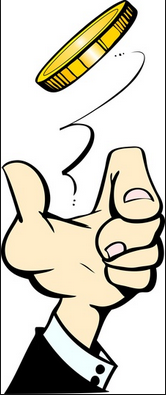Coin Toss
 Four unbiased coins are tossed. We know that at least one of the four coins lands a head.
Four unbiased coins are tossed. We know that at least one of the four coins lands a head.
Now what is the probability that all coins land a head?
Round your answer to three decimal places.
The answer is 0.067.
This section requires Javascript.
You are seeing this because something didn't load right. We suggest you, (a) try
refreshing the page, (b) enabling javascript if it is disabled on your browser and,
finally, (c)
loading the
non-javascript version of this page
. We're sorry about the hassle.
3 solutions
I thought 1 coin always go head. Therefore the probability denominator is 8 and not 16.
Log in to reply
When we say that one of the coins lands heads, we know that the 15 italicized/bolded outcomes of the 16 possible work:
- TTTT
- HTTT
- THTT
- TTHT
- TTTH
- HHTT
- HTHT
- HTTH
- THHT
- THTH
- TTHH
- HHHT
- HHTH
- HTHH
- THHH
- HHHH
If the question said if there were coins A, B, C, and D and we knew that coin A landed heads, then you would be correct and the following 8 italicized/bolded of the 16 possible would work because the first coin is heads in those 8 outcomes:
- TTTT
- HTTT
- THTT
- TTHT
- TTTH
- HHTT
- HTHT
- HTTH
- THHT
- THTH
- TTHH
- HHHT
- HHTH
- HTHH
- THHH
- HHHH
YES ACCORDING TO THE QUESTION THE ANSWER SHOULD BE 1/8 BECAUSE ONE COIN ALWAYS GOES HEAD... ITS KNOWN
That's a convincing solution. Can it be solved using Binomial distribution? Could you please help me with this, its for my educational purpose.
Let A be the event that all 4 coins show heads and let B be the event that at least one of the coins shows a head. Now the conditional probability
P ( A ∣ B ) = P ( B ) P ( A ∩ B ) and P ( A ∩ B ) = P ( B ∩ A ) = P ( B ∣ A ) ∗ P ( A ) ,
and thus P ( A ∣ B ) = P ( B ) P ( B ∣ A ) ∗ P ( A ) . (This is known as Bayes' Theorem .)
If event A occurs then so must event B , so P ( B ∣ A ) = 1 .
Next, since each coin can show heads with probability 2 1 , we have that P ( A ) = ( 2 1 ) 4 = 1 6 1 .
Finally, since the complement B ˉ of B is the event that all coins show tails, which occurs with probability 1 6 1 , we have that
P ( B ) = 1 − P ( B ˉ ) = 1 − 1 6 1 = 1 6 1 5 .
Thus P ( A ∣ B ) = 1 6 1 5 1 ∗ 1 6 1 = 1 5 1 = 0 . 0 6 7 to two significant figures.
Whats wrong in this.. We alrdy know the coin that will give a head..so probability of all heads= heads for rest of the three coins=1/8
Log in to reply
There's nothing wrong with that interpretation; the wording of the question is ambiguous. The interpretation that yields the posted answer is that "at least one of the four coins lands a head." The question has been reported because of this ambiguity, so hopefully when a moderator reviews the wording you will get credit for answering the question.
The fifth line, ( 2 1 ) 4 = 1 6 1 . Not squared.
1/15 : There are 15 of 16 outcomes that have at least one H, and only one of them is HHHH.
Why is this rated level 4?
There are 2 4 = 1 6 possible outcomes to four coin tosses. However we are told that there is at least one head. This rules out one outcome, TTTT. So in the given problem there are fifteen possible, equally likely outcomes. Only one of these is HHHH, and so the desired probability is
1 5 1 ≈ 0 . 0 6 7